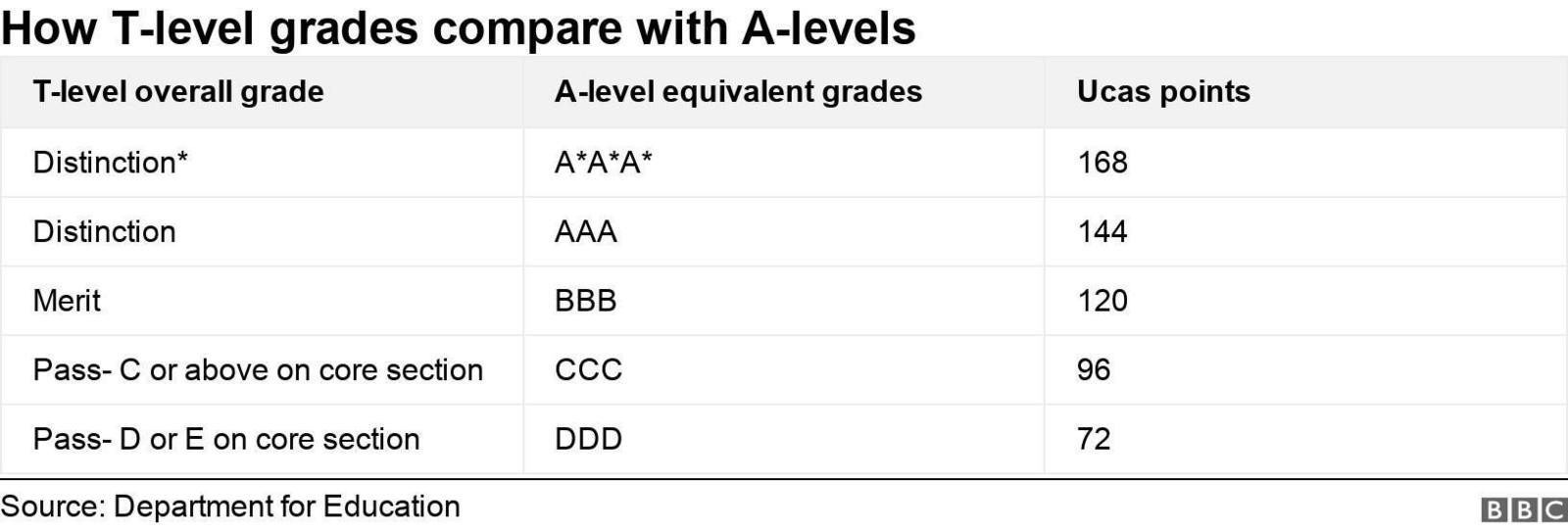Exam board faces £300k fine for 'major failings'

Hundreds of T-level students had to have their exams regraded after the "major failings" by an exam board
- Published
The exams watchdog says it will fine an exam board £300,000 over "major failings" with the papers sat by health and science T-level students in 2022.
Ofqual said it had had to take "unprecedented" action against the exam board, NCFE, to get 1,200 students' results recalculated.
One of the 700 students whose grades were amended as a result told BBC News her T-level had been a "wasted two years".
NCFE chief executive David Gallagher said the board had apologised to students, providers and parents and taken steps to avoid it happening again.
The exam board used to be known as the Northern Council for Further Education but now operates nationally as NCFE.
T-levels were introduced by the Conservative government, in 2020, as a vocational option for students in England to take after their GCSEs.
Each course lasts two years and is roughly equivalent to three A-levels.
Labour did not mention T-levels specifically in its election manifesto but did say it would work on a strategy for post-16 education to address a "widespread" skills shortage.
More than 200 courses scrapped in T-level rollout
- Published19 October 2023
Rushed T-level plans may hold teens back – report
- Published28 April 2023
Ofqual said NCFE had failed to develop "valid question papers" for its T-level qualifications in healthcare, healthcare science, and science.
A petition, external to change the results, launched in August 2022, before the papers were regraded, reached 1,200 signatures.

Grace Darnbrough says her healthcare T-level was "wasted time"
One of those who signed the petition, Grace Darnbrough, now 18, from Rochdale, feels her cohort of healthcare T-level students were "like guinea pigs", being tested on a course that "wasn't ready to be ran".
She remembers her heart sinking and feeling "blindsided" during her science exam, which included questions that had "nothing to do with" what she had been taught about.
Ms Darnbrough had hoped to take a paramedic course at university but was not accepted, which she feels is in part because of the grading issues.
"It's impacted my future," she says.
"They said [T-levels] were going to be the new BTec - they were going to be the same, if not better - it was going to be this amazing thing.
"And unfortunately, it didn't live up to its standard. I wouldn't recommend it to anybody.
"I wasted two years of my career."
'Need compensating'
Ms Darnbrough has since left college and started an emergency-medical-technician apprenticeship, which she says is better equipping her with the skills she needs.
She welcomed the NCFE being fined but said: "That's not going to change our future [or] take us back to where we deserve to be.
"If that course was run well, I would have been able to save a year and be into the career I want to be in - and I've been unable to do that.
"I think we do need compensating, because they've wasted our time."

The number of students taking T-levels has increased each year since they started, and there were 16,085 entrants in the 2023-24 academic year.
As well as classroom learning, the courses - covering practical, rather than academic, subjects such as, external construction, agriculture, education and engineering - involve an occupational specialism and a work placement.
Students have to achieve at least a grade E in their core component, a pass in their occupational specialism and meet the industry placement requirements.
As part of the rollout, the Conservative government had been withdrawing funding for other post-16 courses, such as BTecs, which were deemed to "overlap" with the new T-level programmes.
However, issues such as low take-up of T-levels, a lack of awareness of the qualification among employers and overly complex assessments have led to calls for the new Labour government to pause and review that process.
Critics have also pointed to high dropout rates among the T-level cohort who completed their courses last summer.
Figures showed only 66% of T-level students completed their course in 2023.
The A-level retention rate, by comparison, was 95%, while for vocational alternatives such as applied general qualifications, it was 92%.
And some in the further-education sector say the problems with the health and science exams, sat by a large portion of that same T-level cohort in their first year of study, could be partly behind the high dropout rate last year.
'Significant' penalty
An Ofqual investigation into the 2022 exam papers had identified a number of breaches of the rules awarding organisations legally had to follow, the watchdog said.
They included a failure by NCFE to ensure the right processes were followed in developing the assessments, as well as failing to identify risks that could impede their delivery.
Further breaches had been identified during the 2023 summer exam season, Ofqual said.
Ofqual's notice of its intention to fine sets out how parties might make representations before a final decision is made, although NCFE told BBC News it accepted the outcome and proposed fine.
The £300,000 fine was a "significant" penalty, Ofqual said.
The watchdog's largest fine was a £1.2m penalty issued to Pearson in June 2022 over exams held between 2016 and 2019.
All interventions made by the regulatory body are published on the gov.uk website, external.
Ofqual's executive director of vocational and technical qualifications, Catherine Large, said the NCFE's was a "serious case".
The exam board had been "closely monitored" by Ofqual since and she was pleased it had committed to making "significant improvements".
Mr Gallagher said NCFE had enhanced its quality-assurance processes and risk-management systems and would be working "collaboratively" with Ofqual in future.
Additional reporting by Elaine Dunkley, Kate McGough and Alice Evans.
Get in touch
Are you affected by the issues raised in this story?
Related topics
- Published8 July 2024

- Published2 July 2024

